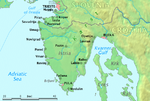Istrian Democratic Assembly
| Istarski demokratski sabor - Dieta Democratica Istriana | |
|---|---|
| Party leader | Boris Miletić |
| founding | 1990 |
| Headquarters | Splitska 3, pp 43 52100 Pula |
| Alignment | Istrian regionalism , social liberalism |
| Parliament seats |
2/151 |
| International connections | Liberal International |
| MEPs |
1/12 |
| European party | ALDE |
| EP Group | Renew Europe (RE) |
| Website | http://www.ids-ddi.com/ |
The Istrian Democratic Assembly (Croatian Istarski demokratski sabor , IDS ; Italian Dieta democratica istriana , DDI ) is a left-wing liberal party in Croatia . As a regional party, the IDS / DDI represents the interests of the people in Istria in particular , but it is also active in national politics. She currently has two seats in the Croatian Parliament. The party leader is Boris Miletić .
Recent history
The party was founded in 1990 before the first free elections in Croatia. However, she chose not to vote in the elections. It enabled the Croatian communists, who had recently renamed themselves to the Social Democratic Party of Croatia (SDP), to win the entire region of Istria by votes. The IDS then ran for the first time in the parliamentary elections in 1992 and used losses of the SDP to conquer all three Istrian electoral districts.
The election result made Istria an area of special attention for Croatian President Franjo Tuđman and his Croatian Democratic Union (HDZ), which dominated all other parts of Croatia. For the first Croatian general election, which coincided with the elections in the newly founded Istria County , a state-controlled media campaign was started, which was aimed almost exclusively at Istria. The campaign turned out to be a spectacular own goal as nearly three quarters of the Istrian voters voted for the IDS. Since that election, no other party has broken the IDS's hegemony in the region.
The IDS advocates a separate cultural and economic identity of Istria and the equal status of the Italian and Croatian languages in Istria. This did not correspond to the pronounced nationally conservative politics of Tuđman. The other Croatian parties proved to be more pragmatic in this regard, so that the IDS formed a coalition with other parties in the Croatian parliament and also in elections. In Istria itself, however, the IDS is embroiled in a violent conflict with the local subsidiary party of the SDP and with the former member and first prefect Luciano Delbianco , who separated from the party and founded the Istrian Democratic Forum .
The IDS was part of the national government for a short time after the successful elections in 2000, when its coalition with the strongest party SDP was victorious. But just a year later, the IDS left the coalition because of disagreements in policy on Istria and the way Ivica Račan 's party treated the coalition partner. However, the IDS continued to support the SDP in parliament.
In 2006 the IDS joined the European Liberal, Democratic and Reform Party (ELDR), today the Alliance of Liberals and Democrats for Europe .
In the election for the Sabor in December 2011, the IDS was victorious with the Kukuriku coalition led by the SDP and entered the coalition government with three ministers. In the 2016 parliamentary elections , the IDS entered a coalition with other Istrian parties. The coalition reached 1.83% and three seats.
literature
- Arno Weckbecker and Frank Hoffmeister, The Development of Political Parties in Former Yugoslavia , 1997 ISBN 3-486-56336-X , pp. 189ff

